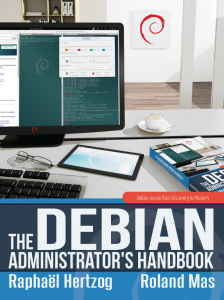 Later than what I hoped, I’m still pleased to be able to announce the availability of the Jessie version of the Debian Administrator’s Handbook.
Later than what I hoped, I’m still pleased to be able to announce the availability of the Jessie version of the Debian Administrator’s Handbook.
Check out the official announce with its special launch offer (a 15% discount on the paperback until Sunday!).
The book’s preface is co-signed by the last three Debian Project Leaders and it has been available through debian.org for a few months now. We are glad to have so much recognition for the hard work we have put in the book over the years.
Thank you all and I hope you will enjoy this new edition!
The work is not yet entirely over us for Roland and I, since we’re now busy updating the French translation of the book. It should be available in the upcoming weeks. Keep posted!
Thank you for all your hard work!
Raphael,
Short question:
Looking forward to buying your book when I get back from my trip next week. Looking to beef up my certifications and learning in Linux and Debian. Any recommendations as to any Debian Certificates that this could be useful for?
Long version:
After many years of using Linux as a casual user (started in college in 2003), I have never tried to install Debian. I used Gentoo for many years. Dabbled in Arch for a time, and around last year I started to distro hop. I was on Fedora/CentOS. Fedora for play, CentOS for work in the past 8 months. Am continuing to use CentOS in order to get some certificates in the near future. I know enough about Linux that I’m highly confident that I can get these certs fairly easily. Shame I don’t see any Debian certificates out there.
I only recently started to use Debian. I had installed it for an hour or so various times when distro hopping in the past, but… It never really attracted me for some reason.
Maybe about a month or so ago, I hopped on. I have to say, I’m loving it from all perspectives. The amount of packages limits any external repositories I need (makes package repos tracking and maintenance much cleaner). Something that in my opinion is lacking in any of the other RPM based distros.
I want to use the same distribution all around, and not have one version here for my wife, another version for work, another version for my personal home computer, another version for my personal laptop. That way, having to maintain the systems are a much more ubiquitous labor.
The different branches make the experience much more “enjoyable”, and gives me a certain amount of flexibility. I could be using sid on a machine, and if at a given moment that the testing freeze happens, I could roll back to testing and stay on the freeze until it becomes the new stable. All of a sudden, I’ve got a useable stable system coming from sid! (at least theoretically 😀 )
Initially I installed stable on all my systems. But of course, my curiosity got the best of me. I’m not sure if you realize this, and I’m quite convinced I’m not alone. Your article “5 reasons why Debian Unstable does not deserve its name” really made me take the plunge into unstable and lose any myths about this.
I was debating between Testing and Sid, and after reading that bug updates and fixes usually come out faster than in Testing, I jumped right into Sid.
Currently, I have my work laptop on sid. I have had enough experience in the past breaking and recovering systems that I feel very confident running this on my daily driver. Also, am looking forward to tapping new bits of knowledge that I will pick up from dealing with this distro. Mainly, how to file bugs for these packages, perhaps how to package some files for debian? Who knows?! 😀
Will be going home soon from a work trip I’m currently on. I have a system that is giving me problems. It’s a skylake machine, and have been having some graphic problems and (per haps unrelated) processor freezes. From asking around in the forums, I’ve been told that Sid would be the way to go rather than stable for this machine.
Looking forward to reading more of your blogs, and getting your new Debian Admin book!
–Xavier
Hello Xavier, thanks for your nice comment!
As per your question, I’m afraid that there is not Debian-specific certification that you can get. That’s the kind of thing that a company creates for its brand but Debian is not a company and it’s hard to find volunteers to organize that kind of stuff.
Cheers, Raphaël.